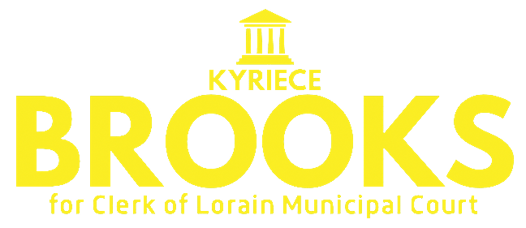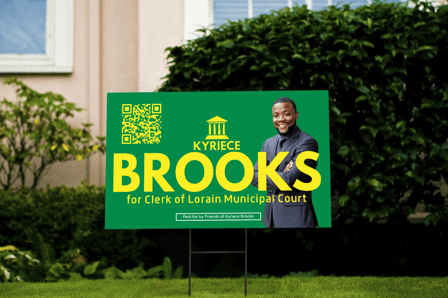The Change We Need, The Voice We Deserve
A RISING TIDE LIFTS ALL SHIPS - DEMOCRAT, REPUBLICAN, INDEPENDENT, BLACK, WHITE, OR LATINO


Kyriece’s campaign for Clerk of Court centers on modernizing the office and building trust with the community – especially for those who have often felt left behind. His platform, inspired by his own experiences and faith, is about combining innovation with compassion. He knows that a more efficient court system can reduce burdens on working families, minorities, immigrants, and all residents who rely on the courts.
“No one should fall into debt because paying a court fine is too complicated.” Kyriece will modernize the way Lorain’s courts handle fines and fees, with online payment options and friendly text/email reminders that ensure working families never miss a deadline. It’s about convenience and fairness for everyone. Join Kyriece’s mission to build a smarter system that works for all of us.


Smarter Collections – Fair and Modern Access to Justice
Many Lorain residents live paycheck-to-paycheck, and a simple traffic ticket or court fine can become a heavy burden. With over a quarter of the city’s population living in poverty, Kyriece is determined to reform how the court handles fines and fees so that no one falls through the cracks due to outdated processes. “Smarter Collections” means using common-sense innovations to make paying obligations easier, more flexible, and more fair, especially for low-income individuals and people of color who have historically faced disproportionate penalties.
Modern Payment Options: As Clerk, Kyriece will implement secure online and mobile payment systems for court fees and tickets. No more needing to take a day off work or find transportation just to pay a fine – residents will be able to pay from home or on their phone, just like a utility bill. This especially helps working parents and those with limited mobility or unreliable transportation in our community’s low-income neighborhoods.
Friendly Reminder Notices: Kyriece understands that missing a payment or court date can happen to anyone, and the consequences can be severe. He will introduce text message and email reminder systems for upcoming court dates, fine due dates, or required documents. Studies show that simple reminders can reduce failure-to-appear rates by up to 26%, preventing thousands of arrest warrants. By sending a quick text – in English and Spanish – the Clerk’s office can ensure people don’t miss important deadlines simply because of a misplaced paper or a lapse in memory. This initiative will especially benefit residents juggling multiple jobs or family obligations, and it treats people with compassion rather than immediately penalizing them.
Flexible Payment Plans: For those who truly cannot afford to pay a fine all at once, Kyriece will advocate for more flexible payment plan options and reasonable grace periods. He will work with judges and use the Clerk’s discretion to minimize punishing people just for being poor. That could mean accepting partial payments without added fees, offering community service alternatives when possible, or at least ensuring that information about hardship exceptions is clearly communicated. Justice shouldn’t be about squeezing revenue from those least able to pay; it should be about compliance and fairness. Kyriece’s approach will help break the cycle where minor fines spiral into bigger problems like suspended licenses or warrants, which often hit low-income and minority residents hardest.
Community Workshops on Court Payments: To build trust, Kyriece plans to hold community workshops in different Lorain neighborhoods (including predominantly Black and Latino churches and community centers) to explain how fines, court costs, and payment plans work. These workshops will be offered in multiple languages – for example, partnering with Spanish-speaking community leaders to host “Know Your Court” nights. By meeting people where they are, Kyriece will ensure that immigrant and minority communities understand their rights and options when it comes to court obligations. This proactive outreach means a single mother who speaks Spanish can ask questions in a comfortable setting, or a young man who grew up in foster care (like Kyriece did) can learn how to avoid a minor ticket turning into a major setback. It’s about empowering citizens with knowledge and reducing the fear and confusion that often surrounds the court process.
In short, “Smarter Collections” is Kyriece’s promise to run the Clerk’s office with efficiency and empathy. Modernizing payments and notifications will make the system more convenient for everyone, and it will particularly help those who need it most: working-class families, seniors, and residents facing economic hardships. Kyriece will ensure that fulfilling your court responsibilities is a smooth process, not a trap. When people can comply easily, we have fewer warrants, fewer license suspensions, and a more just outcome for the community.
“Justice should be just a click away for everyone in Lorain.” Kyriece’s plan includes a new easy-to-use .gov website and multilingual services so that immigrants, seniors, and all our residents can access court information without barriers. From social media updates to forms in Spanish, Kyriece will bring the Clerk’s office into the 21st century. Let’s bridge the digital divide – together. Learn more about Kyriece’s vision for accessible justice.


Technology That Works – Access for All Communities
Kyriece Brooks believes that the Clerk of Court’s office should be as user-friendly as any modern service – accessible at the click of a button, in the languages our residents speak, and transparent to all. Right now, many government websites and court systems are confusing or outdated. Documents might only be in English, or the court’s online information is hard to find. This creates barriers, especially for immigrants, non-native English speakers, and those who aren’t tech-savvy. Kyriece’s “Technology That Works” platform is about upgrading the court’s technology to meet people where they are, so every resident – regardless of language, income, or ability – can connect with the justice system easily.
Independent .GOV Website: Kyriece will push for a dedicated, modern website for the Lorain Municipal Court Clerk’s office, with an easy-to-remember .gov address. Instead of hunting through a generic city site, residents will have a one-stop portal for all Clerk services: paying tickets, searching court records, finding forms, and getting information. The site will be designed with mobile-first usability, since many low-income and younger residents primarily use smartphones for internet access. It will also be kept up-to-date with announcements and FAQ sections. Having a reliable official site builds trust and ensures everyone has the latest information directly from the Clerk’s office.
Multilingual Services and Documents: In a city as diverse as Lorain – nearly one in three residents is Latino – language access isn’t a luxury, it’s a necessity. Kyriece’s plan includes translating key documents, forms, and website content into Spanish (and other prevalent languages in the community). Court instructions, payment plans, and rights information will be available in plain Spanish so that our Spanish-speaking neighbors can understand their obligations without needing a translator. Furthermore, Kyriece will ensure bilingual staff or translation services are available at the Clerk’s office to assist those who speak limited English. Immigrants and refugees will find an office ready to help, not turn them away due to a language barrier. This commitment extends to social media as well – important posts or reminders from the Clerk’s office on platforms like Facebook will be posted in multiple languages to reach as many people as possible.
Expanded Social Media & Outreach: Kyriece recognizes that to truly reach people, you have to go where the people are. He will significantly expand the Clerk’s presence on social media and community channels. That means using Facebook, Twitter, and local radio to broadcast court news, holiday office hours, juror notices, or weather closures. It also means engaging with community groups online – for example, sharing information in neighborhood Facebook groups, minority business associations, and church bulletins. By actively communicating, the Clerk’s office can build a relationship with the public. Technology that works is not just about websites, but about an ongoing conversation with the community in the digital space. If a new payment plan program or amnesty day is introduced, Kyriece will make sure everyone hears about it through posts, text alerts, and partnering with local media.
Digital Inclusion Efforts: Importantly, Kyriece knows that not everyone has easy internet access or feels comfortable online. Technology must work for them, too. Under his leadership, the Clerk’s office will explore setting up a public kiosk or computer station at the courthouse or local libraries where people can access the court website and pay fees electronically, with staff or volunteers to help. He’ll also consider a mobile Clerk’s office day in different parts of Lorain – essentially bringing a laptop and printer to community centers on certain days to help residents look up their case information, fill out forms, or make payments on-site. This kind of digital inclusion outreach ensures that even those without home internet (which often includes low-income families and some seniors) can still benefit from modern conveniences. No one should be left behind in the digital age, and Kyriece will work creatively to merge high-tech solutions with on-the-ground support.
With “Technology That Works,” Kyriece will demystify the court system. Whether you’re a recent immigrant who prefers Spanish, a busy single parent who relies on your phone, or an elderly resident hesitant about computers, Kyriece’s plan is designed to welcome you. It’s about bringing the Clerk’s office into the 21st century in a way that directly serves the people. When technology is done right, it can shine sunlight on government operations and reduce the frustration and confusion that so many feel. Kyriece’s ultimate goal is a Clerk’s office that the community views as approachable and efficient – where forms are simple, information is clear, and help is always just a click (or a phone call) away.
“Behind every case number is a person who deserves respect.” Kyriece will ensure the Clerk’s office treats you with empathy and understanding. As a pastor and abuse survivor, he stands for second chances and community healing. From outreach in our churches to helping connect folks with legal resources, Kyriece will put compassion at the heart of justice. Join Kyriece in creating a safer, kinder Lorain – one act of service at a time.


Justice With Compassion – A Clerk’s Office that Cares
At the heart of Kyriece Brooks’s vision is a simple but profound idea: justice should be administered with compassion. As an ordained minister and longtime community advocate, Kyriece has seen firsthand that treating people with dignity and understanding can change lives. “Justice With Compassion” is a new theme he is introducing to the Clerk of Court role – one that recognizes that behind every case number is a human being. While the Clerk’s office is an administrative position, Kyriece knows it can still be a driver for empathy in the justice system. He plans to draw on his pastoral background and his experience addressing crime and trauma in Lorain’s neighborhoods to make the court more humane and community-centered.
Trauma-Informed Customer Service: Under Kyriece, the Clerk’s staff will receive training in trauma-informed care and customer service. What does that mean for residents? It means when you step up to the Clerk’s window, you’ll be met with patience and respect, not intimidation or indifference. Kyriece will lead by example – as someone who has been on the other side of that window, he understands that court business can be stressful or scary for people, especially for victims of crime, those who have been through foster care, or individuals who have faced discrimination. A compassionate Clerk’s office will treat every person – whether paying a ticket, posting bond, or seeking records – as a valued member of the community. This approach particularly helps minorities and low-income residents who might be used to being treated with skepticism. With Kyriece in charge, empathy will be a standard practice: a small change like a kind word, or a clerk explaining a form slowly in plain language, can make a big difference in someone’s day.
Community Legal Resources and Workshops: Justice with compassion also means not waiting for people to get in trouble, but helping them stay on the right side of the law and navigate the system proactively. Kyriece will collaborate with local organizations to provide proactive access to legal resources. For example, he wants to partner with legal aid clinics, the Lorain County Urban League, and faith-based groups to host “Know Your Rights” clinics and record-sealing (expungement) workshops. These workshops – hosted in church halls, community centers, and even barbershops – will help people clear their old records or understand how to handle minor legal matters before they escalate. By offering information in familiar community settings (with translation available for Spanish and other languages), Kyriece aims to build trust in the justice system among minority communities who may feel alienated or fearful. This kind of outreach in our neighborhoods and churches also sends a message: the Clerk of Court’s office cares about you as a person, not just a case file.
Churches and Neighborhood Outreach: As a pastor and community health worker, Kyriece has long been a comforting presence in Lorain’s hardest-hit areas. He intends to continue this outreach as Clerk. On weekends or evenings, don’t be surprised to find Kyriece at a local church gathering, a youth center, or walking door-to-door with community activists – listening to residents about their concerns with crime, safety, and the courts. He knows that building safer neighborhoods is a team effort. While a Clerk isn’t a judge or a prosecutor, Kyriece sees the position as a connector – connecting people to resources and giving the community feedback a voice in the justice system. For instance, if elders in a predominantly Black church express fear about a rise in neighborhood violence, Kyriece will relay those concerns to the courts and law enforcement in his capacity. If immigrant families share stories of struggling to understand court notices, he’ll use that feedback to improve language access (as outlined in his tech plan). This two-way communication is part of “justice with compassion” – it’s justice that listens and continuously improves based on the community’s needs.
Second Chances and Rehabilitation: Drawing on his experience with Stop the Violence and ministry, Kyriece strongly believes in redemption. He will use the influence of the Clerk’s office to advocate for programs that help defendants turn their lives around. This could mean supporting diversion programs (like drug court or mental health court initiatives) by ensuring the Clerk’s administrative processes for those are smooth and well-publicized. It also means humanizing the process wherever possible – for example, encouraging correspondence or reminders that use respectful language, or providing informational brochures at the Clerk’s window about counseling, job training, or re-entry programs for those coming out of incarceration. Little things, like a flyer for a mentorship program handed out with every juvenile court summons, reflect a compassionate approach. Kyriece cannot set sentencing policies, but he can foster an environment where the default attitude is to help people comply and rehabilitate, not just to punish. As someone who almost fell through the cracks himself, he will champion every opportunity to give others a chance to get back on track.
In essence, Justice With Compassion means never forgetting the human element. Kyriece will be a Clerk of Court who looks beyond the paperwork and sees the people. Whether it’s a frightened domestic violence victim seeking a protection order, a young man paying off a traffic ticket, or a family trying to navigate court bureaucracy, Kyriece’s office will strive to treat them with kindness and understanding. By doing so, he believes the justice system in Lorain can actually help heal the community. Reduced crime isn’t just about enforcement; it’s also about residents feeling respected and willing to work with the system. Kyriece’s compassionate leadership will build those bridges. He has lived through pain and found healing through faith and community, and now he’s ready to bring that healing spirit into the Clerk’s office, so that justice in Lorain is not only fair, but also compassionate.





